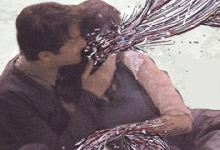
Features | Concerts
Screaming Females
By Christopher Alexander | 11 April 2012
The best song Marissa Paternoster performed at Maxwell’s was “Bell,” Screaming Females’ thesis statement from 2009’s Power Move. The song floats by as a subtly melodic and muscular thing of a piece with any other basement punk band until Paternoster’s larynx goes to shreds in the second verse, giving way to her own post-Masicis guitar shredding and heading back again. It represents all that’s great about the Screamales, and is a de facto blueprint for the rest of their albums—including this year’s mighty Ugly, which formed the vast majority of the set.
The best thing she did, however, came about six songs into the set when some obnoxious drunkard tried to get the crowd into a mosh pit. (Maxwell’s in Hoboken, for those who’ve never been, is about the size of a Chessecake Factory bathroom; the mere act of standing there has one anxiously looking for representatives from the fire marshal.) Getting nothing, he tried to get Paternoster, herself busy with the action of performing a show, to encourage the violence herself. The guitarist, whose on-stage banter had thus far been limited to “thanks so much,” and “this is from our new album,” snapped back immediately at the mosher. “No, I will not tell them to ‘do a circle,’ because it’s dangerous and stupid.” The place applauded, their safety intact. I applauded too, perhaps for different reasons.
CMG alum Lindsay Zoladz wrote a thoughtful piece about Fiona Apple’s music and the expectations the rock (read: male oriented) audience places on female writers and performers. It was heavy on my mind watching this moment, as this drunken man tried to enlist the woman leader of a punk rock group to get the crowd to conform to his violent, macho wishes of a good time. While femininity in punk and indie rock subculture is certainly more commonplace, it isn’t any less remarkable. I wondered, in that moment, how often Paternoster had to put up with these things in New Brunswick basements, dodging flying bodies and beer cups while everyone wonders what she was doing there—because she was dating or trying to date someone else in a band? Did this man expect her to conform to that because he expected women in punk bands to have earned their spot by playing like the boys? Was this sole comment on the evening’s crowd—“no, I will not tell them to ‘do a circle’”—then an elegant gesture of refusal, a reminder to this man that she was not there to be a cheerleader but a musician, a guitarist, a fucking person with ideas of her own?
Maybe; maybe not. Anyone scouring the lyric sheets of Screamale albums is going to be hard pressed to find how, exactly, her minority experience fits into these sketches of revenge fantasies and comfort (which is to say, “rock songs”). I’m also amazed that, gender aside, anyone thought they could get her to do anything against her will. Paternoster employs such ugly, violent volleys of modes and riffs and feedback that her band’s music becomes a manifest force, a wall of sweat bloody throats. It’s intimidating the way all of the best rock bands, from Led Zeppelin through Sleater-Kinney, are. Maybe the dude was just impressed by the band’s oft-lauded accessibility and do-it-yourself ethic, and thought the mere fact of their punkness would get him in her ear. Maybe he didn’t think about her as a woman, necessarily, at all. If she was no cheerleader, she was no policeman, either: the same dude tried crowd-surfing with limited success to two of the band’s older songs, and as the band roared on behind him, ferocious and groovy, you almost couldn’t blame him.
You could still hate him, though.





